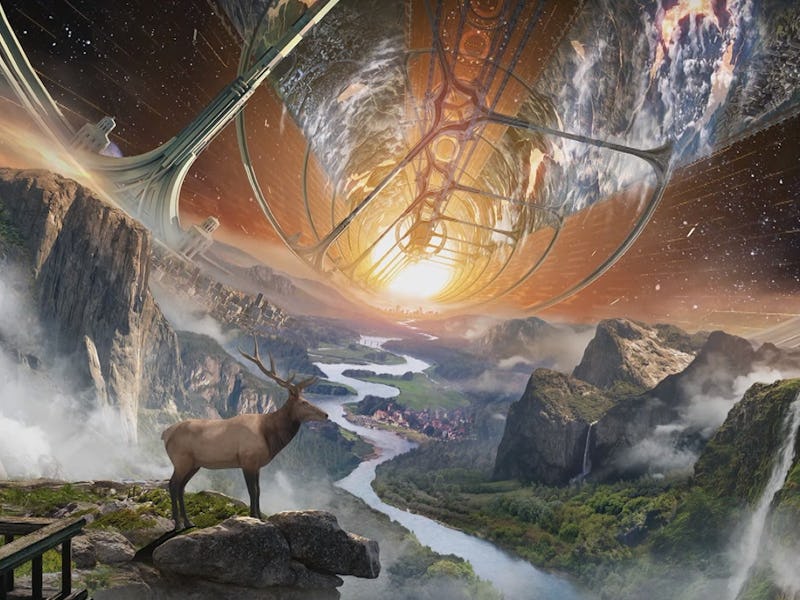Why Jeff Bezos’ vision of space is “more expansive” than Elon Musk’s
Rand Simberg, the space entrepreneur and consultant, explains how the vision of floating space cities offers a more attractve vision of the future of space.

Elon Musk’s Mars city? It’s nothing compared to Jeff Bezos’ vision.
The two billionaires are locked in a race to send humans to space, with Musk’s SpaceX far in front of Bezos’ Blue Origin venture. But the two differ on what to do when humanity arrives in space: Musk wants to establish a self-sustaining city on Mars, while Bezos would rather see humans orbiting Earth in giant space stations.
Musk’s vision receives a lot of publicity, but space consultant Rand Simberg tells Inverse that Bezos’ goal is the “more expansive.”
“Elon is what [science fiction writer Isaac] Asimov would have called a planetary chauvinist,” he says. “He thinks people need to be on planets. He wants to be a multi-planet species. That's nice, I guess. But Bezos actually has a more expansive vision.”
Simberg wrote the 2013 book Safe Is Not an Option, where he argued that NASA and other agencies’ focus on making spaceflight as safe as possible stifled exploration. Eight years on from the book’s publication, private companies have soared in the race to space — each with their own visions.
For Simberg, the coming new era of spaceflight will mark the start of a massive expansion of humanity’s presence in space.
“The kinds of things that we were promised back in the movie 2001 [A Space Odyssey], I think we’re going to be seeing that kind of stuff,” he says.
Want to hear more of Simberg’s controversial opinions, the possibly regressive role of the FAA, and the SpaceX invention that could “change everything”? Read the full interview, only in MUSK READS+.
Elon Musk vs. Jeff Bezos: The two visions
For Musk, the goal is to transform humanity into a multi-planet species. He wants to use the Starship, a fully-reusable rocket currently under development at the company’s Texas facility, as a springboard. Where an existing rocket like the Falcon 9 can carry four people into space using the Crew Dragon capsule, the Starship is designed to carry 100 at a time.
Artist's rendering of the SpaceX Starship on Mars.
Beyond ferrying a lot of people, SpaceX intends to use it for trips to Mars. The ship uses liquid oxygen and methane as fuel. That means astronauts could go to Mars, refuel utilizing the planet’s resources, and either return home or venture out further.
Musk plans to use the ship to build a million-strong, self-sustaining city on Mars. Last week, he declared that the city would help humanity explore the stars — having humans on two planets means if something happens to one world, the other can continue to explore the stars.
“Earth is ~4.5B years old, but life is still not multiplanetary and it is extremely uncertain how much time is left to become so,” Musk wrote on Twitter.
Bezos has a different vision in mind. In May 2019, he explained how humanity could live in orbiting space colonies similar to those envisioned by physicist Gerard K. O’Neill. The physicist claimed that these would be better than planetary surfaces because they enable real-time communication with Earth and it’s easier to return home.
Bez's vision of a future space colony.
Why expand into space? Because human energy use effectively doubles every 25 years. In around 200 years, humanity would need to cover the Earth in solar panels to meet its needs, Bezos claimed at the time.
Expanding into space would enable humanity to continue growing, potentially to a population of one trillion humans. It could support, Bezos said, “a thousand Mozarts, or a thousand Einsteins.”
So why is the latter better? Simberg argues that Earth is pretty good, so staying close by isn’t a bad idea.
“This is the best planet in the Solar System,” he says. “The thing that Elon doesn’t seem to appreciate [...] it’s not obvious he’s given a lot of thought about what you do when you get there.”
Musk would argue that Mars could support a thriving economy, from pizzerias to iron foundries. But for Simberg, there’s a lot of unknowns around human physiology and partial gravity. Not enough research has been done into the long-term effects.
“There’s a huge ethical issue right now with sending people to Mars to live ... we don’t know if they can have healthy kids,” he says.
In the coming decades, a Bezos-looking economy could start to thrive in low-Earth orbit.
“We’re going to see large rotating space facilities, space hotels,” he says. “We are going to see thousands of people going to space, visiting, living, working, playing in space. Barring some planetary catastrophe, I think that’s what we’re going to see.”
Compared to the unknown of expanding to other planets, nearby space stations could prove a more attractive option.
TO READ THE FULL INTERVIEW, SUBSCRIBE TO MUSK READS+.
Here is what you will gain from subscribing to MUSK READS+:
- Three emails per week, enabling fans to go deeper into the week’s stories.
- Original interviews and reporting, longform analysis, previews, and recaps of major events, including earnings calls and more.
- Community-focused extras like responses to reader mail, an upcoming event calendar, and notable anniversaries.
- An archive of previous subscriber-only content, so you can easily read back over what you might have missed.
- Promotional deals and offers.
- Supporting original, independent journalism.
MUSK READS+ is a fully independent operation. We are not Elon Musk, nor are we employed by him. Our job is to report the events we find important, giving you the inside look at the worlds of space rockets, electric cars, clean energy, and more. It means first-hand accounts of a SpaceX rocket launch, Tesla insights from third-party analysts, and more.
If you want to support us in our mission, and receive original interviews and analysis, consider contributing with a subscription.